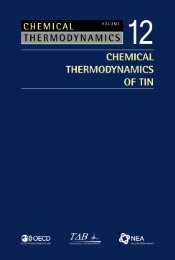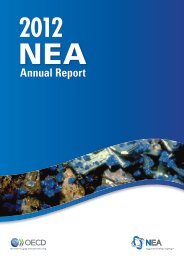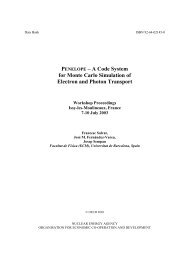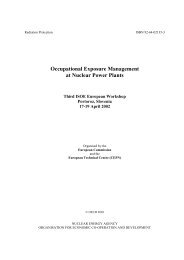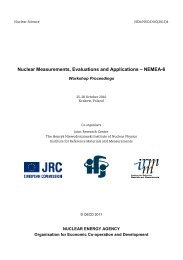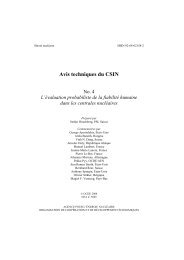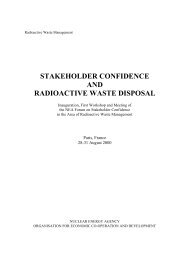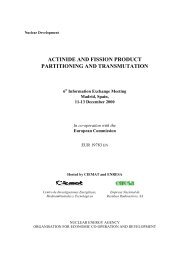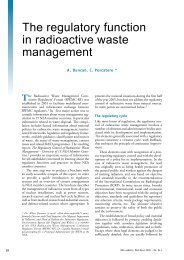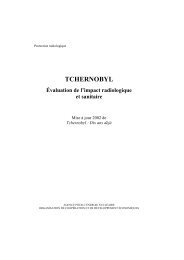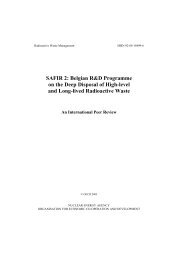- Page 1: Nuclear Science 2010 Nuclear Produc
- Page 4 and 5: ORGANISATION FOR ECONOMIC CO-OPERAT
- Page 7 and 8: TABLE OF CONTENTS Table of contents
- Page 9 and 10: TABLE OF CONTENTS Y. Gong, E. Chalk
- Page 11 and 12: EXECUTIVE SUMMARY Executive summary
- Page 13 and 14: EXECUTIVE SUMMARY steam turbine, in
- Page 15 and 16: EXECUTIVE SUMMARY sulphur depositio
- Page 17 and 18: EXECUTIVE SUMMARY affords saving 35
- Page 19 and 20: EXECUTIVE SUMMARY safety assessment
- Page 21: EXECUTIVE SUMMARY The question was
- Page 24 and 25: CHANGING THE WORLD WITH HYDROGEN AN
- Page 26 and 27: CHANGING THE WORLD WITH HYDROGEN AN
- Page 28 and 29: CHANGING THE WORLD WITH HYDROGEN AN
- Page 30 and 31: CHANGING THE WORLD WITH HYDROGEN AN
- Page 32 and 33: CHANGING THE WORLD WITH HYDROGEN AN
- Page 35 and 36: NUCLEAR HYDROGEN PRODUCTION PROGRAM
- Page 37: NUCLEAR HYDROGEN PRODUCTION PROGRAM
- Page 41 and 42: FRENCH RESEARCH STRATEGY TO USE NUC
- Page 43 and 44: FRENCH RESEARCH STRATEGY TO USE NUC
- Page 45 and 46: FRENCH RESEARCH STRATEGY TO USE NUC
- Page 47 and 48: FRENCH RESEARCH STRATEGY TO USE NUC
- Page 49 and 50: PRESENT STATUS OF HTGR AND HYDROGEN
- Page 51 and 52: PRESENT STATUS OF HTGR AND HYDROGEN
- Page 53 and 54: PRESENT STATUS OF HTGR AND HYDROGEN
- Page 55 and 56: PRESENT STATUS OF HTGR AND HYDROGEN
- Page 57 and 58: PRESENT STATUS OF HTGR AND HYDROGEN
- Page 59 and 60: PRESENT STATUS OF HTGR AND HYDROGEN
- Page 61 and 62: STATUS OF THE KOREAN NUCLEAR HYDROG
- Page 63 and 64: STATUS OF THE KOREAN NUCLEAR HYDROG
- Page 65 and 66: STATUS OF THE KOREAN NUCLEAR HYDROG
- Page 67 and 68: STATUS OF THE KOREAN NUCLEAR HYDROG
- Page 69 and 70: THE CONCEPT OF NUCLEAR HYDROGEN PRO
- Page 71 and 72: THE CONCEPT OF NUCLEAR HYDROGEN PRO
- Page 73 and 74: THE CONCEPT OF NUCLEAR HYDROGEN PRO
- Page 75 and 76: THE CONCEPT OF NUCLEAR HYDROGEN PRO
- Page 77: THE CONCEPT OF NUCLEAR HYDROGEN PRO
- Page 80 and 81: CANADIAN NUCLEAR HYDROGEN R&D PROGR
- Page 82 and 83: CANADIAN NUCLEAR HYDROGEN R&D PROGR
- Page 84 and 85: CANADIAN NUCLEAR HYDROGEN R&D PROGR
- Page 86 and 87: CANADIAN NUCLEAR HYDROGEN R&D PROGR
- Page 88 and 89:
CANADIAN NUCLEAR HYDROGEN R&D PROGR
- Page 90 and 91:
APPLICATION OF NUCLEAR-PRODUCED HYD
- Page 92 and 93:
APPLICATION OF NUCLEAR-PRODUCED HYD
- Page 94 and 95:
APPLICATION OF NUCLEAR-PRODUCED HYD
- Page 96 and 97:
APPLICATION OF NUCLEAR-PRODUCED HYD
- Page 98 and 99:
APPLICATION OF NUCLEAR-PRODUCED HYD
- Page 100 and 101:
APPLICATION OF NUCLEAR-PRODUCED HYD
- Page 103 and 104:
STATUS OF THE INL HIGH-TEMPERATURE
- Page 105 and 106:
STATUS OF THE INL HIGH-TEMPERATURE
- Page 107 and 108:
STATUS OF THE INL HIGH-TEMPERATURE
- Page 109 and 110:
STATUS OF THE INL HIGH-TEMPERATURE
- Page 111 and 112:
STATUS OF THE INL HIGH-TEMPERATURE
- Page 113 and 114:
STATUS OF THE INL HIGH-TEMPERATURE
- Page 115 and 116:
STATUS OF THE INL HIGH-TEMPERATURE
- Page 117 and 118:
STATUS OF THE INL HIGH-TEMPERATURE
- Page 119:
STATUS OF THE INL HIGH-TEMPERATURE
- Page 122 and 123:
HIGH-TEMPERATURE STEAM ELECTROLYSIS
- Page 124 and 125:
HIGH-TEMPERATURE STEAM ELECTROLYSIS
- Page 126 and 127:
HIGH-TEMPERATURE STEAM ELECTROLYSIS
- Page 128 and 129:
HIGH-TEMPERATURE STEAM ELECTROLYSIS
- Page 131:
MATERIALS DEVELOPMENT FOR SOEC Mate
- Page 134 and 135:
A METALLIC SEAL FOR HIGH-TEMPERATUR
- Page 136 and 137:
A METALLIC SEAL FOR HIGH-TEMPERATUR
- Page 138 and 139:
A METALLIC SEAL FOR HIGH-TEMPERATUR
- Page 140 and 141:
A METALLIC SEAL FOR HIGH-TEMPERATUR
- Page 142 and 143:
DEGRADATION MECHANISMS IN SOLID OXI
- Page 144 and 145:
DEGRADATION MECHANISMS IN SOLID OXI
- Page 146 and 147:
DEGRADATION MECHANISMS IN SOLID OXI
- Page 149 and 150:
CAUSES OF DEGRADATION IN A SOLID OX
- Page 151 and 152:
70 μm CAUSES OF DEGRADATION IN A S
- Page 153 and 154:
CAUSES OF DEGRADATION IN A SOLID OX
- Page 155 and 156:
CAUSES OF DEGRADATION IN A SOLID OX
- Page 157 and 158:
NUCLEAR HYDROGEN USING HIGH TEMPERA
- Page 159 and 160:
NUCLEAR HYDROGEN USING HIGH TEMPERA
- Page 161 and 162:
NUCLEAR HYDROGEN USING HIGH TEMPERA
- Page 163 and 164:
NUCLEAR HYDROGEN USING HIGH TEMPERA
- Page 165 and 166:
NUCLEAR HYDROGEN USING HIGH TEMPERA
- Page 167:
SESSION III: THERMOCHEMICAL SULPHUR
- Page 170 and 171:
CEA ASSESSMENT OF THE SULPHUR-IODIN
- Page 172 and 173:
CEA ASSESSMENT OF THE SULPHUR-IODIN
- Page 174 and 175:
CEA ASSESSMENT OF THE SULPHUR-IODIN
- Page 176 and 177:
CEA ASSESSMENT OF THE SULPHUR-IODIN
- Page 178 and 179:
CEA ASSESSMENT OF THE SULPHUR-IODIN
- Page 181:
STATUS OF THE INERI SULPHUR-IODINE
- Page 184 and 185:
INFLUENCE OF HTR CORE INLET AND OUT
- Page 186 and 187:
INFLUENCE OF HTR CORE INLET AND OUT
- Page 188 and 189:
INFLUENCE OF HTR CORE INLET AND OUT
- Page 190 and 191:
INFLUENCE OF HTR CORE INLET AND OUT
- Page 192 and 193:
INFLUENCE OF HTR CORE INLET AND OUT
- Page 194 and 195:
EXPERIMENTAL STUDY OF THE VAPOUR-LI
- Page 196 and 197:
EXPERIMENTAL STUDY OF THE VAPOUR-LI
- Page 198 and 199:
EXPERIMENTAL STUDY OF THE VAPOUR-LI
- Page 200 and 201:
EXPERIMENTAL STUDY OF THE VAPOUR-LI
- Page 203:
DEVELOPMENT OF HI DECOMPOSITION PRO
- Page 206 and 207:
SOUTH AFRICA’S NUCLEAR HYDROGEN P
- Page 208 and 209:
SOUTH AFRICA’S NUCLEAR HYDROGEN P
- Page 210 and 211:
SOUTH AFRICA’S NUCLEAR HYDROGEN P
- Page 212 and 213:
SOUTH AFRICA’S NUCLEAR HYDROGEN P
- Page 214 and 215:
SOUTH AFRICA’S NUCLEAR HYDROGEN P
- Page 216 and 217:
INTEGRATED LABORATORY SCALE DEMONST
- Page 218 and 219:
INTEGRATED LABORATORY SCALE DEMONST
- Page 220 and 221:
INTEGRATED LABORATORY SCALE DEMONST
- Page 222 and 223:
INTEGRATED LABORATORY SCALE DEMONST
- Page 225:
DEVELOPMENT STATUS OF THE HYBRID SU
- Page 229 and 230:
RECENT CANADIAN ADVANCES IN THE THE
- Page 231 and 232:
RECENT CANADIAN ADVANCES IN THE THE
- Page 233 and 234:
RECENT CANADIAN ADVANCES IN THE THE
- Page 235 and 236:
RECENT CANADIAN ADVANCES IN THE THE
- Page 237 and 238:
AN OVERVIEW OF R&D ACTIVITIES FOR T
- Page 239 and 240:
AN OVERVIEW OF R&D ACTIVITIES FOR T
- Page 241 and 242:
AN OVERVIEW OF R&D ACTIVITIES FOR T
- Page 243 and 244:
AN OVERVIEW OF R&D ACTIVITIES FOR T
- Page 245 and 246:
STUDY OF THE HYDROLYSIS REACTION OF
- Page 247 and 248:
STUDY OF THE HYDROLYSIS REACTION OF
- Page 249 and 250:
STUDY OF THE HYDROLYSIS REACTION OF
- Page 251 and 252:
STUDY OF THE HYDROLYSIS REACTION OF
- Page 253 and 254:
DEVELOPMENT OF CuCl-HCl ELECTROLYSI
- Page 255 and 256:
DEVELOPMENT OF CuCl-HCl ELECTROLYSI
- Page 257 and 258:
DEVELOPMENT OF CuCl-HCl ELECTROLYSI
- Page 259:
DEVELOPMENT OF CuCl-HCl ELECTROLYSI
- Page 262 and 263:
EXERGY ANALYSIS OF THE Cu-Cl CYCLE
- Page 264 and 265:
EXERGY ANALYSIS OF THE Cu-Cl CYCLE
- Page 266 and 267:
EXERGY ANALYSIS OF THE Cu-Cl CYCLE
- Page 268 and 269:
EXERGY ANALYSIS OF THE Cu-Cl CYCLE
- Page 271 and 272:
CaBr 2 HYDROLYSIS FOR HBr PRODUCTIO
- Page 273 and 274:
CaBr 2 HYDROLYSIS FOR HBr PRODUCTIO
- Page 275 and 276:
CaBr 2 HYDROLYSIS FOR HBr PRODUCTIO
- Page 277 and 278:
CaBr 2 HYDROLYSIS FOR HBr PRODUCTIO
- Page 279 and 280:
CaBr 2 HYDROLYSIS FOR HBr PRODUCTIO
- Page 281:
SESSION V: ECONOMICS AND MARKET ANA
- Page 284 and 285:
DEVELOPMENT OF THE HYDROGEN ECONOMI
- Page 286 and 287:
DEVELOPMENT OF THE HYDROGEN ECONOMI
- Page 288 and 289:
DEVELOPMENT OF THE HYDROGEN ECONOMI
- Page 291 and 292:
NUCLEAR H 2 PRODUCTION - A UTILITY
- Page 293 and 294:
NUCLEAR H 2 PRODUCTION - A UTILITY
- Page 295 and 296:
NUCLEAR H 2 PRODUCTION - A UTILITY
- Page 297 and 298:
NUCLEAR H 2 PRODUCTION - A UTILITY
- Page 299 and 300:
NUCLEAR H 2 PRODUCTION - A UTILITY
- Page 301 and 302:
ALKALINE AND HIGH-TEMPERATURE ELECT
- Page 303 and 304:
ALKALINE AND HIGH-TEMPERATURE ELECT
- Page 305 and 306:
ALKALINE AND HIGH-TEMPERATURE ELECT
- Page 307 and 308:
ALKALINE AND HIGH-TEMPERATURE ELECT
- Page 309 and 310:
THE PRODUCT OF HYDROGEN BY NUCLEAR
- Page 311 and 312:
THE PRODUCT OF HYDROGEN BY NUCLEAR
- Page 313 and 314:
THE PRODUCT OF HYDROGEN BY NUCLEAR
- Page 315 and 316:
THE PRODUCT OF HYDROGEN BY NUCLEAR
- Page 317 and 318:
THE PRODUCT OF HYDROGEN BY NUCLEAR
- Page 319 and 320:
SUSTAINABLE ELECTRICITY SUPPLY IN T
- Page 321 and 322:
SUSTAINABLE ELECTRICITY SUPPLY IN T
- Page 323 and 324:
SUSTAINABLE ELECTRICITY SUPPLY IN T
- Page 325 and 326:
SUSTAINABLE ELECTRICITY SUPPLY IN T
- Page 327:
SUSTAINABLE ELECTRICITY SUPPLY IN T
- Page 330 and 331:
PROHYTEC, THE FRENCH INDUSTRIAL PLA
- Page 332 and 333:
PROHYTEC, THE FRENCH INDUSTRIAL PLA
- Page 334 and 335:
PROHYTEC, THE FRENCH INDUSTRIAL PLA
- Page 336 and 337:
NHI ECONOMIC ANALYSIS OF CANDIDATE
- Page 338 and 339:
NHI ECONOMIC ANALYSIS OF CANDIDATE
- Page 340 and 341:
NHI ECONOMIC ANALYSIS OF CANDIDATE
- Page 342 and 343:
NHI ECONOMIC ANALYSIS OF CANDIDATE
- Page 344 and 345:
NHI ECONOMIC ANALYSIS OF CANDIDATE
- Page 346 and 347:
MARKET VIABILITY OF NUCLEAR HYDROGE
- Page 348 and 349:
POSSIBILITY OF ACTIVE CARBON RECYCL
- Page 350 and 351:
POSSIBILITY OF ACTIVE CARBON RECYCL
- Page 352 and 353:
POSSIBILITY OF ACTIVE CARBON RECYCL
- Page 354 and 355:
POSSIBILITY OF ACTIVE CARBON RECYCL
- Page 357 and 358:
NUCLEAR SAFETY AND REGULATORY CONSI
- Page 359 and 360:
NUCLEAR SAFETY AND REGULATORY CONSI
- Page 361 and 362:
NUCLEAR SAFETY AND REGULATORY CONSI
- Page 363:
NUCLEAR SAFETY AND REGULATORY CONSI
- Page 366 and 367:
TRANSIENT MODELLING OF S-I CYCLE TH
- Page 368 and 369:
TRANSIENT MODELLING OF S-I CYCLE TH
- Page 370 and 371:
TRANSIENT MODELLING OF S-I CYCLE TH
- Page 372 and 373:
TRANSIENT MODELLING OF S-I CYCLE TH
- Page 374 and 375:
TRANSIENT MODELLING OF S-I CYCLE TH
- Page 376 and 377:
TRANSIENT MODELLING OF S-I CYCLE TH
- Page 378 and 379:
TRANSIENT MODELLING OF S-I CYCLE TH
- Page 380 and 381:
PROPOSED CHEMICAL PLANT INITIATED A
- Page 382 and 383:
PROPOSED CHEMICAL PLANT INITIATED A
- Page 384 and 385:
PROPOSED CHEMICAL PLANT INITIATED A
- Page 386 and 387:
PROPOSED CHEMICAL PLANT INITIATED A
- Page 388 and 389:
PROPOSED CHEMICAL PLANT INITIATED A
- Page 390 and 391:
CONCEPTUAL DESIGN OF THE HTTR-IS NU
- Page 392 and 393:
CONCEPTUAL DESIGN OF THE HTTR-IS NU
- Page 394 and 395:
CONCEPTUAL DESIGN OF THE HTTR-IS NU
- Page 396 and 397:
CONCEPTUAL DESIGN OF THE HTTR-IS NU
- Page 399 and 400:
USE OF PSA FOR DESIGN OF EMERGENCY
- Page 401 and 402:
USE OF PSA FOR DESIGN OF EMERGENCY
- Page 403 and 404:
USE OF PSA FOR DESIGN OF EMERGENCY
- Page 405 and 406:
USE OF PSA FOR DESIGN OF EMERGENCY
- Page 407 and 408:
USE OF PSA FOR DESIGN OF EMERGENCY
- Page 409 and 410:
HEAT PUMP CYCLE BY HYDROGEN-ABSORBI
- Page 411 and 412:
HEAT PUMP CYCLE BY HYDROGEN-ABSORBI
- Page 413 and 414:
HEAT PUMP CYCLE BY HYDROGEN-ABSORBI
- Page 415 and 416:
HEAT PUMP CYCLE BY HYDROGEN-ABSORBI
- Page 417:
HEAT PUMP CYCLE BY HYDROGEN-ABSORBI
- Page 420 and 421:
HEAT EXCHANGER TEMPERATURE RESPONSE
- Page 422 and 423:
HEAT EXCHANGER TEMPERATURE RESPONSE
- Page 424 and 425:
HEAT EXCHANGER TEMPERATURE RESPONSE
- Page 426 and 427:
HEAT EXCHANGER TEMPERATURE RESPONSE
- Page 428 and 429:
HEAT EXCHANGER TEMPERATURE RESPONSE
- Page 430 and 431:
HEAT EXCHANGER TEMPERATURE RESPONSE
- Page 432 and 433:
HEAT EXCHANGER TEMPERATURE RESPONSE
- Page 435 and 436:
ALTERNATE VHTR/HTE INTERFACE FOR MI
- Page 437 and 438:
ALTERNATE VHTR/HTE INTERFACE FOR MI
- Page 439 and 440:
ALTERNATE VHTR/HTE INTERFACE FOR MI
- Page 441 and 442:
ALTERNATE VHTR/HTE INTERFACE FOR MI
- Page 443 and 444:
ALTERNATE VHTR/HTE INTERFACE FOR MI
- Page 445 and 446:
ALTERNATE VHTR/HTE INTERFACE FOR MI
- Page 447:
POSTER SESSION CONTRIBUTIONS Poster
- Page 450 and 451:
ACTIVITIES OF NUCLEAR RESEARCH INST
- Page 452 and 453:
ACTIVITIES OF NUCLEAR RESEARCH INST
- Page 455 and 456:
A URANIUM THERMOCHEMICAL CYCLE FOR
- Page 457 and 458:
A URANIUM THERMOCHEMICAL CYCLE FOR
- Page 459:
MEETING ORGANISATION Annex 1: Meeti
- Page 462 and 463:
LIST OF PARTICIPANTS REYTIER, Magal
- Page 464 and 465:
LIST OF PARTICIPANTS BROWN, Nichola
- Page 466:
LIST OF PARTICIPANTS SINK, Carl US




